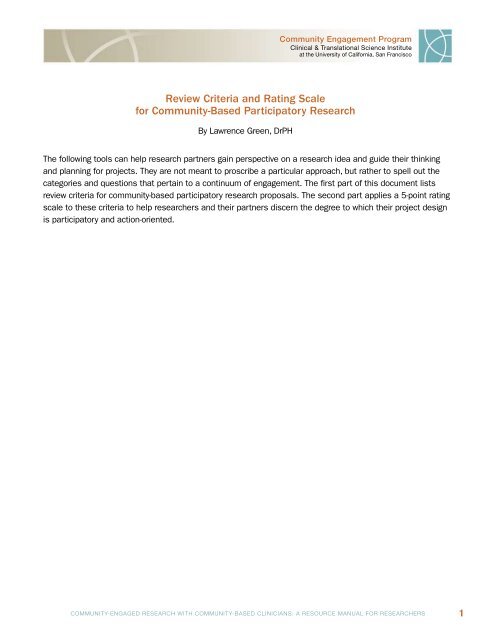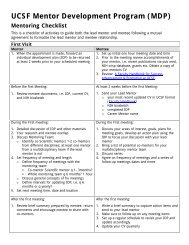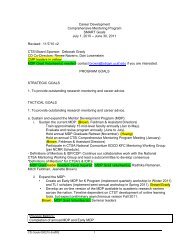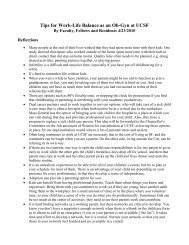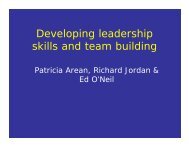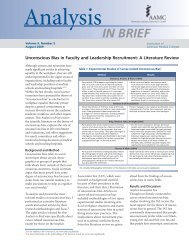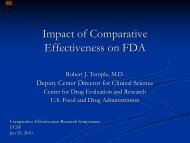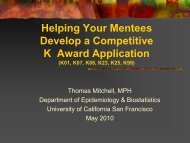Review Criteria and Rating Scale for Community-Based ... - Accelerate
Review Criteria and Rating Scale for Community-Based ... - Accelerate
Review Criteria and Rating Scale for Community-Based ... - Accelerate
Create successful ePaper yourself
Turn your PDF publications into a flip-book with our unique Google optimized e-Paper software.
<strong>Community</strong> Engagement Program<br />
Clinical & Translational Science Institute<br />
at the University of Cali<strong>for</strong>nia, San Francisco<br />
<strong>Review</strong> <strong>Criteria</strong> <strong>and</strong> <strong>Rating</strong> <strong>Scale</strong><br />
<strong>for</strong> <strong>Community</strong>-<strong>Based</strong> Participatory Research<br />
By Lawrence Green, DrPH<br />
The following tools can help research partners gain perspective on a research idea <strong>and</strong> guide their thinking<br />
<strong>and</strong> planning <strong>for</strong> projects. They are not meant to proscribe a particular approach, but rather to spell out the<br />
categories <strong>and</strong> questions that pertain to a continuum of engagement. The first part of this document lists<br />
review criteria <strong>for</strong> community-based participatory research proposals. The second part applies a 5-point rating<br />
scale to these criteria to help researchers <strong>and</strong> their partners discern the degree to which their project design<br />
is participatory <strong>and</strong> action-oriented.<br />
COMMUNITY-ENGAGED RESEARCH WITH COMMUNITY-BASED CLINICIANS: A RESOURCE MANUAL FOR RESEARCHERS 1
<strong>Community</strong> Engagement Program<br />
Clinical & Translational Science Institute<br />
at the University of Cali<strong>for</strong>nia, San Francisco<br />
<strong>Review</strong> <strong>Criteria</strong> <strong>for</strong> CBPR Applications 1<br />
Lawrence Green, DrPH<br />
Participants <strong>and</strong> the nature<br />
of their involvement:<br />
n<br />
n<br />
n<br />
n<br />
Is the community of interest clearly described<br />
or defined?<br />
Do members of the defined community<br />
participating in the research have concern<br />
or experience with the issue?<br />
Are interested members of the defined<br />
community provided opportunities to participate<br />
in the research process?<br />
Has attention been given to establishing<br />
within the community an underst<strong>and</strong>ing<br />
of the researchers’ commitment to the<br />
issue?<br />
Origin of the research question:<br />
Process <strong>and</strong> methodological implications:<br />
n<br />
n<br />
n<br />
n<br />
Does the research process apply the<br />
knowledge of community participants in<br />
the phases of planning, implementation<br />
<strong>and</strong> evaluation?<br />
For community participants, does the<br />
process allow <strong>for</strong> learning about research<br />
methods?<br />
For researchers, does the process allow<br />
<strong>for</strong> learning about the community health<br />
issue?<br />
Are community participants involved in<br />
analytic issues: interpretation, synthesis<br />
<strong>and</strong> the verification of conclusions?<br />
Nature of the research outcomes:<br />
n<br />
Did the impetus <strong>for</strong> the research come<br />
from the defined community?<br />
n<br />
Do community participants benefit from<br />
the research outcomes?<br />
n<br />
Is an ef<strong>for</strong>t to research the issue supported<br />
by members of the defined community?<br />
Purpose of the research:<br />
n<br />
Can the research facilitate learning<br />
among community participants about<br />
individual <strong>and</strong> collective resources <strong>for</strong> selfdetermination?<br />
n<br />
n<br />
Is there attention to or an explicit agreement<br />
between researchers <strong>and</strong> community<br />
participants with respect to ownership<br />
of the research data?<br />
Is there attention to or an explicit agreement<br />
between researchers <strong>and</strong> community<br />
participants with respect to the<br />
dissemination of the research results?<br />
n<br />
Is the purpose of the research to empower<br />
the community to address determinants<br />
of health?<br />
1 Drawn from Agency <strong>for</strong> Healthcare Research <strong>and</strong> Quality. <strong>Community</strong>-<strong>Based</strong><br />
Participatory Research—Assessing the Evidence—Evidence Report/Technology<br />
Assessment Number 99, 2004.<br />
http://www.ahrq.gov/downloads/pub/evidence/pdf/cbpr/cbpr.pdf<br />
COMMUNITY-ENGAGED RESEARCH WITH COMMUNITY-BASED CLINICIANS: A RESOURCE MANUAL FOR RESEARCHERS 2
<strong>Review</strong> <strong>Criteria</strong> with <strong>Rating</strong> <strong>Scale</strong> of Possible Responses 2<br />
1. Participants <strong>and</strong> the nature of their involvement:<br />
a. Is the community of interest clearly<br />
described or defined?<br />
b. Do members of the defined community<br />
participating in the research have<br />
concern or experience with the issue?<br />
c. Are interested members of the defined<br />
community provided opportunities to<br />
participate in the research process?<br />
d. Is attention given to barriers to participation,<br />
with consideration of those who have been<br />
under-represented in the past?<br />
e. Has attention been given to establishing<br />
within the community an underst<strong>and</strong>ing of<br />
the researchers’ commitment to the issue?<br />
f. Are community participants enabled to<br />
contribute their physical <strong>and</strong>/or intellectual<br />
resources to the research process?<br />
1 2 3 4 5<br />
no description inexplicit/general general description general detailed detailed description<br />
description but explicit description<br />
1 2 3 4 5<br />
no concern or little concern or moderate concern much concern or high concern or<br />
experience with the experience with the or experience with experience with experience with<br />
issue<br />
issue<br />
the issue<br />
the issue<br />
the issue<br />
no opportunity<br />
to participate<br />
no attention to<br />
offsetting barriers<br />
no enabling of<br />
contribution from<br />
participants<br />
1 2 3 4 5<br />
little opportunity<br />
to participate<br />
more than one<br />
opportunity to<br />
participate<br />
several<br />
opportunities to<br />
participate<br />
many opportunities<br />
to participate<br />
1 2 3 4 5<br />
low degree of moderate degree of several<br />
attention to attention to opportunities to<br />
offsetting barriers offsetting barriers participate<br />
high degree of<br />
attention to<br />
offsetting barriers<br />
1 2 3 4 5<br />
no attention to low attention to moderate attention high attention to explicit agreement<br />
researchers’ researchers’ to researchers’ researchers’ on researchers’<br />
commitment commitment commitment commitment commitment<br />
1 2 3 4 5<br />
mostly researcher about equal contributions<br />
mostly resources <strong>and</strong><br />
ef<strong>for</strong>t; some support<br />
from participants ef<strong>for</strong>ts of participants;<br />
<strong>for</strong> contribution from <strong>and</strong> researchers researchers have some<br />
participants<br />
direct input<br />
full enabling of<br />
participants’ resources<br />
(researchers act only<br />
as facilitators<br />
2. Origin of the research study:<br />
a. Did the impetus <strong>for</strong> the research come<br />
from the defined community?<br />
b. Is an ef<strong>for</strong>t to research the issue supported<br />
by members of the defined community?<br />
1 2 3 4 5<br />
issue posed by impetus mainly from impetus shared equally impetus mainly from issue posed by<br />
researchers or other researchers; some between researchers community; some community<br />
external bodies input from community <strong>and</strong> community input from researchers<br />
support <strong>for</strong> research<br />
from very few, if any,<br />
community members<br />
1 2 3 4 5<br />
less than half of community is roughly more than half of<br />
community supports divided about community supports<br />
research on issue research on issue research on issue<br />
support <strong>for</strong> research<br />
from virtually all<br />
community members<br />
3. Purpose of the research:<br />
a. Can the research facilitate learning among<br />
community participants about individual <strong>and</strong><br />
collective resources <strong>for</strong> self-determination?<br />
b. Can the research facilitate collaboration<br />
between community participants <strong>and</strong><br />
resources external to the community?<br />
c. Is the purpose of the research to empower<br />
the community to address determinants<br />
of health?<br />
d. Does the scope of the research encompass<br />
some combination of political, social <strong>and</strong><br />
economic determinants of health?<br />
no provision <strong>for</strong><br />
learning process<br />
no potential<br />
<strong>for</strong> collaboration<br />
1 2 3 4 5<br />
purpose devoid of low priority given moderate priority moderate/high high priority <strong>for</strong><br />
empowerment to empowerment <strong>for</strong> empowerment priority <strong>for</strong> empowerment<br />
empowerment<br />
objective<br />
objective<br />
objective<br />
objective<br />
objective<br />
no consideration of<br />
political, social or economic<br />
determinants<br />
1 2 3 4 5<br />
low provision <strong>for</strong> moderate provision<br />
high provision <strong>for</strong><br />
learning process <strong>for</strong> learning process<br />
learning process<br />
moderate/high<br />
provision <strong>for</strong><br />
learning process<br />
1 2 3 4 5<br />
low potential moderate potential<br />
high potential<br />
<strong>for</strong> collaboration <strong>for</strong> collaboration<br />
<strong>for</strong> collaboration<br />
moderate/high<br />
potential <strong>for</strong><br />
collaboration<br />
1 2 3 4 5<br />
only one or two limited consideration moderate consideration<br />
determinants are of combined determinants<br />
of combined<br />
considered<br />
of health determinants of health<br />
comprehensive<br />
consideration of combined<br />
determinants<br />
COMMUNITY-ENGAGED RESEARCH WITH COMMUNITY-BASED CLINICIANS: A RESOURCE MANUAL FOR RESEARCHERS 3
4. Process <strong>and</strong> context/methodological implications:<br />
a. Does the research process apply the knowledge<br />
of community participants in phases of<br />
planning, implementation & evaluation?<br />
b. For community participants, does the<br />
process allow <strong>for</strong> learning about research<br />
methods?<br />
c. For researchers, does the process allow <strong>for</strong><br />
learning about the community health issue?<br />
d. Does the process allow <strong>for</strong> flexibility or<br />
change in research methods <strong>and</strong> focus,<br />
as necessary?<br />
e. Are procedures in place <strong>for</strong> appraising<br />
experiences during implementation of<br />
the research?<br />
f. Are community participants involved in<br />
analytic issues: interpretation, synthesis <strong>and</strong><br />
the verification of conclusions?<br />
no use of community<br />
knowledge in<br />
any phase<br />
no opportunity<br />
<strong>for</strong> learning about<br />
research<br />
no opportunity<br />
<strong>for</strong> learning about<br />
community issue<br />
methods & focus<br />
predetermined; no<br />
potential <strong>for</strong> flexibility<br />
no procedures <strong>for</strong><br />
appraising experiences<br />
no involvement of<br />
participants in any<br />
analytic issue<br />
1 2 3 4 5<br />
use of community limited use of community<br />
moderate use of com-<br />
knowledge in one or<br />
knowledge in munity knowledge in<br />
two phases only all three phases all three phases<br />
1 2 3 4 5<br />
low opportunity moderate opportunity moderate/high opportunity<br />
<strong>for</strong> learning about <strong>for</strong> learning about<br />
<strong>for</strong> learning<br />
research<br />
research about research<br />
1 2 3 4 5<br />
low opportunity moderate opportunity moderate/high<br />
<strong>for</strong> learning about <strong>for</strong> learning about opportunity to learn<br />
community issue community issue about community issue<br />
1 2 3 4 5<br />
mostly predetermined equal blend of predetermined<br />
high flexibility; some<br />
methods & focus;<br />
methods & predetermined<br />
limited flexibility focus w/ flexibility methods & focus<br />
1 2 3 4 5<br />
few procedures <strong>for</strong> some procedures <strong>for</strong> many procedures <strong>for</strong><br />
appraising experienceences<br />
appraising experi-<br />
appraising experiences<br />
1 2 3 4 5<br />
involvement in one or<br />
two analytic issues only<br />
limited involvement of<br />
participants in all three<br />
analytic issues<br />
moderate involvement<br />
of participants in all<br />
three analytic issues<br />
comprehensive use of<br />
community knowledge<br />
in all three phases<br />
high opportunity<br />
<strong>for</strong> learning about<br />
research<br />
high opportunity<br />
<strong>for</strong> learning about<br />
community issue<br />
complete flexibility;<br />
methods & focus not<br />
predetermined<br />
comprehensive<br />
procedures <strong>for</strong> appraising<br />
experiences<br />
comprehensive<br />
involvement in all three<br />
analytic issues<br />
5. Opportunities to address the issue of interest:<br />
a. Is the potential of the defined community <strong>for</strong><br />
individual <strong>and</strong> collective learning reflected by<br />
the research process?<br />
research process not<br />
aligned w/ potential<br />
<strong>for</strong> learning<br />
1 2 3 4 5<br />
limited alignment of moderate alignment of moderate/high<br />
research process w/ research process w/ alignment w/<br />
potential <strong>for</strong> learning potential <strong>for</strong> learning potential <strong>for</strong> learning<br />
comprehensive<br />
alignment w/ potential<br />
<strong>for</strong> learning<br />
b. Is the potential of the defined community <strong>for</strong><br />
action reflected by the research process?<br />
c. Does process reflect commitment by researchers<br />
& community participants to social,<br />
individual or cultural actions consequent to<br />
learning acquired through research?<br />
research process<br />
not aligned with<br />
potential <strong>for</strong> action<br />
no commitment to<br />
action beyond data<br />
collection & analysis,<br />
writing report <strong>for</strong><br />
funding agencies<br />
1 2 3 4 5<br />
limited alignment of moderate alignment of moderate/high<br />
research process w/ research process w/ alignment w/<br />
potential <strong>for</strong> action potential <strong>for</strong> action potential <strong>for</strong> action<br />
comprehensive<br />
alignment w/<br />
potential <strong>for</strong> action<br />
1 2 3 4 5<br />
low commitment to moderate commitment<br />
moderate/high<br />
social actions based<br />
to social commitment to<br />
on learning through actions based on social actions based<br />
research learning through on learning through<br />
research<br />
research<br />
comprehensive<br />
commitment to<br />
social actions based<br />
on learning through<br />
research<br />
COMMUNITY-ENGAGED RESEARCH WITH COMMUNITY-BASED CLINICIANS: A RESOURCE MANUAL FOR RESEARCHERS 4
6. Nature of the research outcomes:<br />
a. Do community participants benefit from the<br />
research outcomes?<br />
b. Is there attention to or an explicit agreement <strong>for</strong><br />
acknowledging/resolving in a fair <strong>and</strong> open way<br />
any differences between researchers <strong>and</strong> community<br />
participants in interpretation of results?<br />
c. Is there attention to or an explicit agreement between<br />
researchers <strong>and</strong> community participants<br />
with respect to ownership of the research data?<br />
research benefits<br />
researchers or<br />
external bodies only<br />
no attention to or any<br />
agreement re<br />
interpretation of<br />
issues<br />
no attention to or<br />
any agreement re<br />
ownership issues<br />
1 2 3 4 5<br />
researchers/external equal benefit <strong>for</strong> research benefits<br />
bodies benefit researchers/external community primarily;<br />
primarily; community bodies <strong>and</strong> benefit is secondary<br />
benefit is secondary community <strong>for</strong> researchers <strong>and</strong><br />
external bodies<br />
1 2 3 4 5<br />
low attention to moderate consideration<br />
interpretation of<br />
of interpretation<br />
issues<br />
issues<br />
1 2 3 4 5<br />
low attention to<br />
ownership issues<br />
moderate consideration<br />
of ownership<br />
issues<br />
high attention<br />
to interpretation<br />
issues; no explicit<br />
agreement<br />
high attention to<br />
ownership issues; no<br />
explicit agreement<br />
explicit agreement<br />
on how research will<br />
benefit community<br />
explicit agreement on<br />
interpretation issues<br />
explicit agreement<br />
on ownership issues<br />
d. Is there attention to or an explicit agreement between<br />
researchers <strong>and</strong> community participants<br />
with respect to the dissemination fo the research<br />
results?<br />
no attention to or any<br />
agreement regarding<br />
dissemination issues<br />
1 2 3 4 5<br />
low attention to<br />
dissemination issues<br />
moderate<br />
consideration of<br />
dissemination issues<br />
high atttention<br />
to dissemination<br />
issues; no explicit<br />
agreement<br />
explicit agreement<br />
on dissemination<br />
issues<br />
2 Guidelines <strong>and</strong> Categories <strong>for</strong> Classifying Participatory Research Projects in<br />
Health Promotion from Green LW, George MA, Daniel M, Frankish CJ, Herbert CP,<br />
Bowie WR, O’Neill M. Study of Participatory Research in Health Promotion. Royal<br />
Society of Canada, Ottawa, Ontario, 1995:43-50.<br />
http://www.lgreen.net/guidelines.html<br />
COMMUNITY-ENGAGED RESEARCH WITH COMMUNITY-BASED CLINICIANS: A RESOURCE MANUAL FOR RESEARCHERS 5


